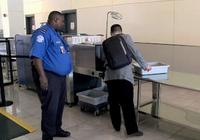-
Raytheon unveils new law enforcement tech center
Last week Raytheon opened the doors for the first time to its new state of the art law enforcement technology center in Downey, California
-
-
GovSec Conference focuses on key security challenges

This year’s annual GovSec Security Conference and Expo aims to train the nation’s law enforcement officials on how to tackle the most pressing national security threats facing the United States
-
-
Using ozone to kill prions dead

Prions are among the worst infectious-disease agents; these proteins are resistant to a wide variety of extreme disinfectant procedures; they have been identified as the culprits behind mad cow disease and chronic wasting disease in animals and humans, and are also implicated in Creutzfeldt-Jakob disease and other prion-related disorders
-
-
Food safety business plan competition
Two Michigan-based organizations announce a business plan competition for ventures in the food safety area; entrepreneurs with new food safety business concepts will compete for $10,000 prize
-
-
Advanced forensic tool for the battlefield
A forensic tool could soon make the analysis of evidence faster and more accurate, giving military investigators an advantage in the wars against drugs and terror
-
-
Accenture develops crime management system for Norway
Accenture is developing a new national crime management system for the Norwegian National Police Directorate (POD) to support police investigations and criminal prosecutions in Norway; the crime management system will enable the Norwegian police force to manage, link, and analyze case information and intelligence for more reliability and consistency across law enforcement, police investigations, border management, emergency response, and case administration
-
-
Compact helmet-display for first responders

Engineers at Physical Optics Corp. are working with DHS’ Science and Technology Directorate (S&T) to develop a helmet-mounted micro display system for first responders designed to improve their situational awareness
-
-
New bill to allow more private screeners at airports

Private security companies could soon be taking over passenger screening at U.S. airports thanks to recently passed legislation that has cleared both the Senate and the House; the proposed law would require that the Transportation Security Administration (TSA) allow airports to switch to private contractors unless it can demonstrate that the move is not cost-effective and hinders security
-
-
Four-legged robot carries troops’ load
The increasing weight of military equipment has a negative impact on soldiers’ readiness and effectiveness; reducing the load on dismounted soldiers has thus become a major point of emphasis for defense research and development; the Legged Squad Support System (LS3) robot follows squad members through rugged terrain and interact with them in a natural way, similar to the way a trained animal and its handler interact, while carrying 400 lbs. of squad’s gear
-
-
U.S. Navy’s railgun takes an important step forward
In the coming weeks the first industry railgun prototype launcher will be tested at a U.S. Navy facility in Virginia; the railgun launcher is a long-range weapon that fires projectiles using electricity instead of chemical propellants
-
-
ISC West goes hi-tech
This year Reed Exhibitions is going hi-tech for its ISC West security conference; the show’s organizers have developed a special mobile app and other technological changes to make this year’s show more convenient for attendees
-
-
New methodology evaluates risk of scarce metals
China produces more than 95 of the world’s rare Earth metals, making governments and businesses around the world uneasy; researchers develop a methodology ti answer two important questions: how do we know what is scarce? If we know a metal is scarce, how do we know whether we should worry about it?
-
-
Wireless underground robots for first responders
First responders may have to look for victims in hostile or challenging environments, such as clandestine tunnels, subway systems, and underground structures; sending a wireless robot to look around and pull victims out would be safer
-
-
BAE enters U.S. critical infrastructure protection market
British defense Giant BAE Systems recently announced its plans to enter the U.S. critical infrastructure security market
-
-
Obama unveils global supply chain protection strategy

Last week the Obama administration unveiled its new counterterrorism strategy aimed at securing the entirety of the global supply chain
-
More headlines
The long view
Factories First: Winning the Drone War Before It Starts
Wars are won by factories before they are won on the battlefield,Martin C. Feldmann writes, noting that the United States lacks the manufacturing depth for the coming drone age. Rectifying this situation “will take far more than procurement tweaks,” Feldmann writes. “It demands a national-level, wartime-scale industrial mobilization.”
Trump Is Fast-Tracking New Coal Mines — Even When They Don’t Make Economic Sense
By Katie Myers
In Appalachian Tennessee, mines shut down and couldn’t pay their debts. Now a new one is opening under the guise of an “energy emergency.”
Smaller Nuclear Reactors Spark Renewed Interest in a Once-Shunned Energy Source
By David Montgomery
In the past two years, half the states have taken action to promote nuclear power, from creating nuclear task forces to integrating nuclear into long-term energy plans.
